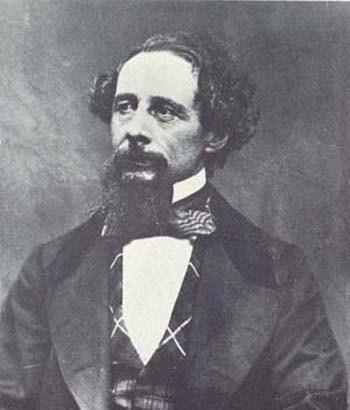Christopher Hitchens’s last essay for Vanity Fair was published late last week. It’s an appreciation of Charles Dickens, a writer Hitchens loved—he also wrote about the novelist for The Atlantic in 2010. This time around, Hitchens leads with an encounter that has become the subject of some dispute: the supposed 1862 meeting, in the London office of Dickens’s magazine All the Year Round, of Charles Dickens and Fyodor Dostoevsky. According to a 2002 article in The Dickensian, the Russian novelist recounted this meeting in an 1878 letter to his doctor and friend S.D. Yanovksy. That letter includes this remarkable passage, cited by Hitchens, in which Dostoevsky describes what Dickens told him:
He told me that all the good simple people in his novels, Little Nell, even the holy simpletons like Barnaby Rudge, are what he wanted to have been, and his villains were what he was (or rather, what he found in himself), his cruelty, his attacks of causeless enmity towards those who were helpless and looked to him for comfort, his shrinking from those whom he ought to love, being used up in what he wrote. There were two people in him, he told me: one who feels as he ought to feel and one who feels the opposite. From the one who feels the opposite I make my evil characters; from the one who feels as a man ought to feel I try to live my life. Only two people? I asked.
This letter made it into Michael Slater’s 2009 biography of Dickens, and it apparently shows up in Claire Tomalin’s new life of the author: David Gates, in his review of the Tomalin book for The New York Times Book Review, also mentions the encounter right near the top (how could you not?), saying that Tomalin calls it “amazing.”
Scholars, sadly, seem to find it less “amazing” than “dubious,” and a correction was appended to Gates’s piece a couple weeks after it ran, noting that “some scholars have questioned the authenticity of the letter and whether the meeting ever occurred.”
Hitchens was aware of the problems with the letter when he wrote his Vanity Fair essay: Immediately after quoting it, he questions its authenticity. “It could have happened,” he writes, “but I doubt it.”
You can read more about the problems with the letter at the blog of Sarah J. Young, a lecturer in Russian at University College London. And the whole Hitchens essay is worth a read, too; at one point, Hitchens wrestles with what he sees as one of the more regrettable legacies of Dickens, and attempts to forgive him for it:
He loved the idea of a birthday celebration, being lavish about it, reminding people that they were once unborn and are now launched. This is bighearted, and we might all do a bit more of it. It would help me to forgive, perhaps just a little, the man who helped generate the Hallmark birthday industry and who, with some of his less imposing and more moistly sentimental prose scenes in A Christmas Carol, took the Greatest Birthday Ever Told and helped make it into the near Ramadan of protracted obligatory celebration now darkening our Decembers.
